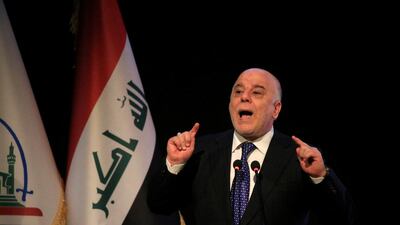Iraqi prime minister Haider Al Abadi has rebuffed pressure from regional and western allies to dismantle the predominantly militias that helped him defeat ISIL.
The militias known collectively as the Hashed Al Shaabi, Popular Mobilisation Units (PMUs) or Popular Mobilisation Forces (PMF), were formed in 2014 after Ayatollah Ali Al Sistani, Iraq's top Shiite cleric, urged citizens to take up arms against ISIL militants who had swept aside government forces and seized control of much of northern Iraq.
Haider Al Abadi on Sunday described calls to disband the Hashed as an “attempt to drive a wedge between the army and the militias”.
“Some individuals have tried to provoke the army against the Hashed Al Shaabi but they failed. They are our forces who follow the general command of the armed forces,” Mr Al Abadi said during a victory parade in the holy city of Najaf.
“We must not forget the sacrifices that Iraqis have made and we must take advantage of this harsh lesson."
With Iraq declaring victory over ISIL in December, the future of the militias has come to the forefront as the country prepares for general elections that must be held by early May.
Iraq’s Shiite majority view the Hashed’s 150,000 fighters as their saviours from ISIL, making the task of disarming the militas before the polls one of Mr Al Abadi’s biggest challenges.
Politicians close to Mr Al Abadi say he is under pressure from the West and regional Sunni allies to dissolve the Hashed now that the extremist group is no longer a major threat.
"Prime minister Abadi is getting messages from allies in the war against Daesh encouraging him to dismantle the PMF as a condition to keeping their support flowing in future,” one of Mr Al Abadi’s advisers told Reuters.
__________
Read more:
Al Abadi urges unity as Iraq faces more challenges in 2018
Iraq's militias: after victory over ISIL, will next battle be at the ballot box?
__________
The militias, most of which are trained and supported by Iran, are seen as an instrument of Tehran's regional ambitions and have also been accused of abuses against Iraqi Sunnis and other minorities.
Britain will hold a parliamentary hearing on Tuesday after a former cabinet adviser and Nato official revealed that the government has ignored its own intelligence warning of an increased Iranian influence in the Hashed.
Tom Hardie-Forsyth said in written evidence to the foreign affairs select committee that “UK ministers possessed detailed intelligence warning of precise links between Tehran and Baghdad-backed Shiite militias operating in Iraq”.
The claim follows a crackdown by Iraq’s central government on its Kurdish region after it held an independence referendum in September despite Baghdad’s insistence that it violated the constitution. The central government halted all international flights to and from Iraqi Kurdistan and sent troops to retake disputed areas held by Kurdish forces outside of the autonomous region.
The hearing will ask British foreign office minister Alistair Burt to justify the UK's assertion that Baghdad recaptured disputed Kurdish-held territory with “limited clashes and loss of life”.
Mr Hardie-Forsyth's evidence says that after the capture of the disputed territories, the Hashed forces "successfully encouraged Baghdad to take a heavily punitive approach to the Kurds post-referendum, thus advancing Tehran's ends ...up to and beyond the Iraqi-Syrian border".
Meanwhile, the European Union on Monday released a policy proposal for supporting post-ISIL Iraq in which it pointed out that the country “needs to seize the renewed opportunity it has to build an inclusive and accountable political system that serves all communities, regions and beliefs, preserves the country's diversity, and enhances its democratic order".
“This is essential to rebuild trust between the people and their government and to avoid a return to divisive sectarianism and separatism,” the document said.


